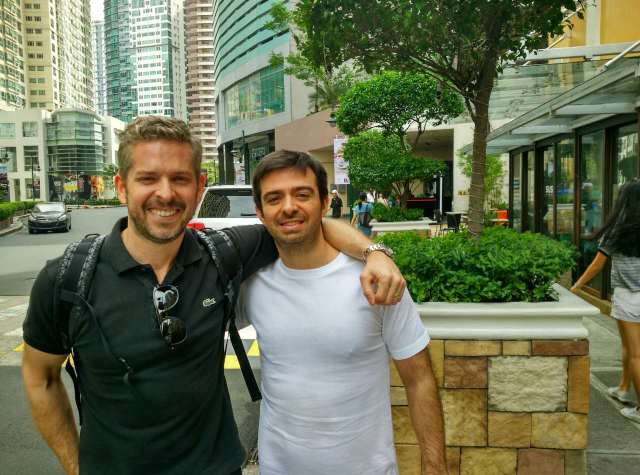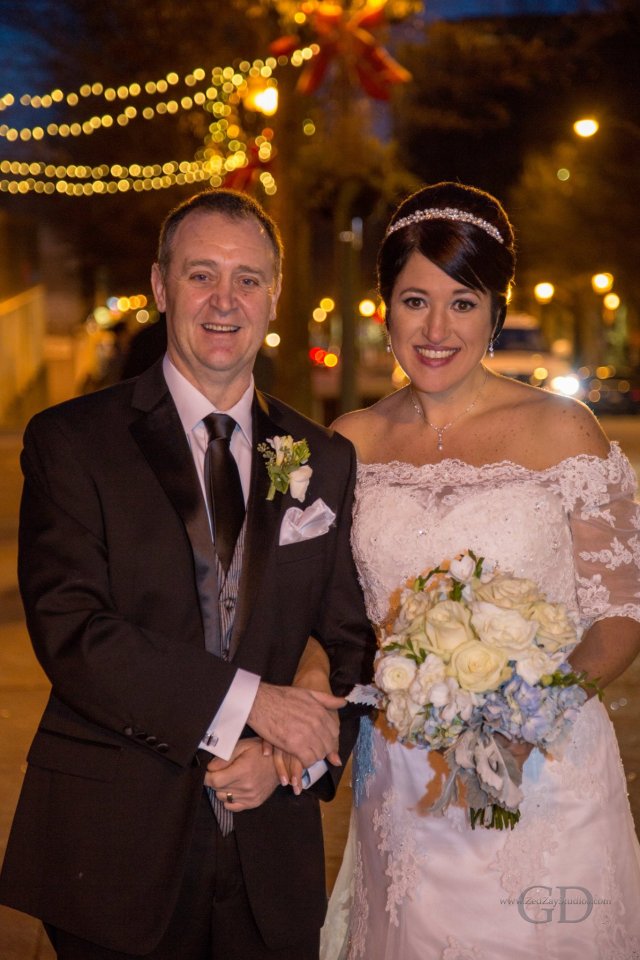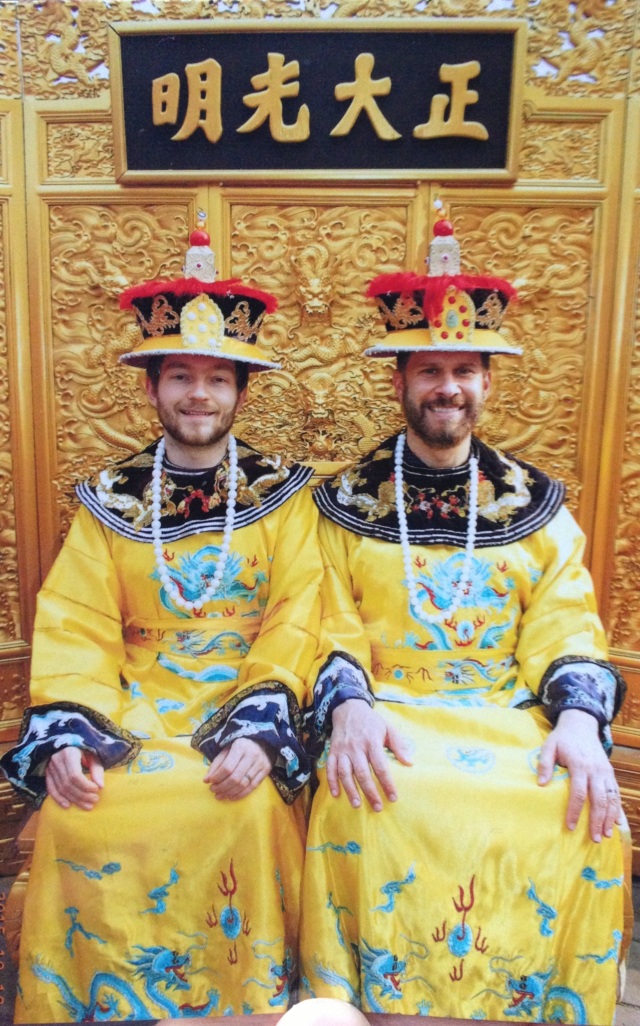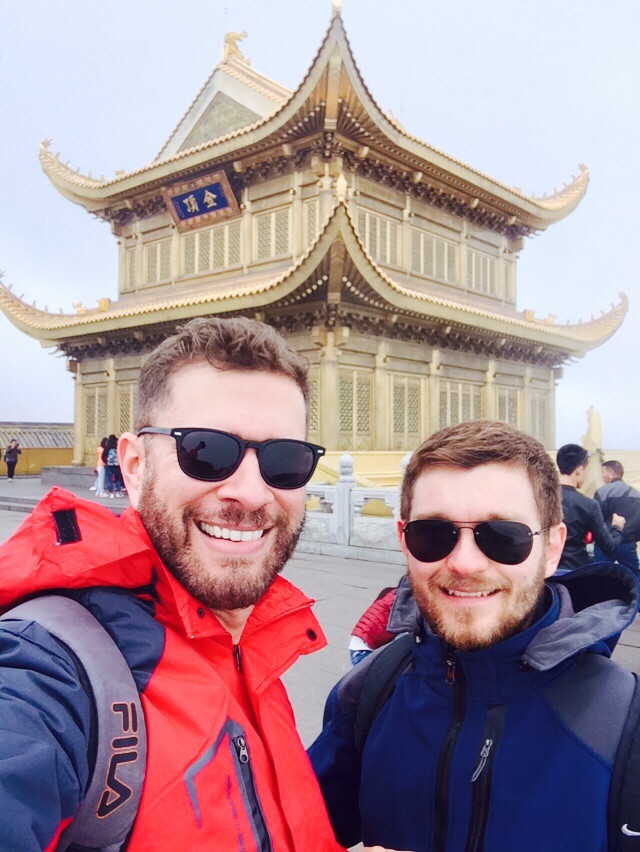
Hi Brian and welcome to the series! First of all, please could you tell me a little about yourself and your partner/family.
My name is Brian, a native Australian and naturalised Swede. I am trailing spouse of a Swedish diplomat, and we have a 4-year old daughter (dual Australian/Swedish). We are presently posted in Iran. Prior to this we have been posted to China (where we met), Syria, Sweden, Belgium, and Austria. I have also been posted to Thailand, while my wife worked in China.
As a male trailing spouse, how did you feel when you first arrived in your new country?
Every posting is the same, and yet at the same time different, at the start; that is to say there are things you find normal for every arrival, and things you notice are different. It is all about compare and contrast! I don’t think that being newly arrived is much different for male spouses as female. Certainly, however, the spouse’s arrival is very different from the arrival of the posted officer who often immediately has work to preoccupy them
Arrival is always hectic, filled with new people, new places, and new sights and sounds. You need to make a lot of notes, get very familiar with maps of the area, names of places, and where to go for this and that. In hardship postings, that initial difficulty is often greater, and start-up fatigue is more common.
The cycle of postings is clear that, even in difficult places, there is a honeymoon period where things are all new and mostly interesting, and you are striving to make the posting fit you, or the other way around. It is the fast-learning-curve end of the posting.
In difficult places, this is more about acting quickly to create your ‘nest’, and finding any networks for support. It is also about a crash course in taxi-level language, map-reading, shopping guide, eating guide, and finding out what groups, if any, exist for networking and support. And, of course, about settling the child into schooling, with the logistical issues that often brings.
In easy places (admittedly I find it dangerous to call any major international relocation ‘easy’), setting up home and network is less urgent because there are lots of familiarities and less hostility in the context. Exploring and ‘conquering’ the new context is considerably faster in easy posts, but common to both sexes of spouse.
Have you had to give up a job/career and if so how did you feel about this?
Yes. I gave it up at the start so that we could be together. I had a job that was to take me back to Australia after we had really only just met. So I quit that job of more than 12 years and joined the UN to be nearer, and after a year of that, starting a consultancy to focus on freelance contracts around the world. For a lot of reasons, furthering the relationship included, it was an easy decision.
In hindsight, I was young and self-confident enough to take it rather lightly, or at least with more gusto than I perhaps should have. I would not have so easily jumped in (or is it out?) if I had known the trials and tribulations of working when permanently on the move.
There are severely constrained choices confronting the trailing spouse to develop into a location-independent professional. Freelancing is the most obvious fit for spouses. However, this often means being away from home and post for long periods, as well as the vagaries of securing contracts, major financial ups and downs, and little in the way of financial consistency, for example, pension, allowances, and taxation.
A lot also depends on how easily you can service contracts from the posting; some difficult posts, for example, have such lousy communications (both internet and air traffic), that clients drop off quickly when they cannot even get you on the phone. That certainly cools the enthusiasm for consulting work.
Frankly, jobs that are all about working from home are by far the best for all trailing spouses, as long as communications by phone and computer work well.
Have you found it easy to fit in and make friends? Have you met other men accompanying their partners or are you a rare species? If you have met others where and how have you met them?
In Tehran, I am a rare species. The Diplomatic Ladies Group even had to change their name and constitution to allow male members. And still, in the end, being almost the lone male was unsatisfying for several reasons; the group activities were strongly focused on women (perfectly fairly, since women are 99.9% the membership). And it felt like any suggestions I might have to change the group would subvert the real needs and interests of the group.
Being a male trailing spouse makes more difference in difficult posts, or strict Islamic posts, In both of which there are fewer male spouses and fewer contacts with other expatriates and the local population as well. In other difficult postings I have been less of a rare species, and sometimes been able to eke out strong friendships with one or two other male spouses. But being a working spouse, which often demanded travel and long periods away from the post, militated somewhat against forming friendships. In easy postings, it is less necessary to establish a network with other male spouses; friends can be found in many other places.
In both difficult and easy posts, I find it is really important to be a ‘joiner’, at least in the first 6-12 months. Join groups, clubs, meetups etc and also accompany the spouse to events to make acquaintances. Although male diplomats mostly fully ignore male spouses, sometimes you can make a breakthrough through asking questions like “do you play squash?” etc. And sometimes, just sometimes, male diplomats won’t drop your hand before the handshake is done; they might actually want to get to know you even if meeting spouses is not the reason they came to the event.
Do you think it is harder for men than women to accompany their partners abroad – and if so, why?
Yes. There are a number of factors, social, economic, and personal. Male spouses often have indelibly imprinted on them the need to have a job, and provide for the family. That is hard to break and even the staunchest male feminist can have trouble rising above identity issues such as that.
Male spouses are also a fairly rare commodity, even with the egalitarian Swedish foreign service. And this is especially so in hardship places. So making friends for them is overall harder than female spouses who can often engage with a much larger grouping of spouses in every post also looking for doing things together.
Whether we agree with it or not, the simple fact is that many female spouses don’t want to hang out overly much with male spouses and vice versa.
Male spouses are also treated differently by male diplomats: I think the male diplomats don’t quite know what to make of a man who stays home with the children, whether the spouse is working or not. Let’s put it this way, as the male spouse you are not of primary interest to male diplomats for their information needs, which means many do not bother trying to understand out at all. Those who do, however, can often become friends because both sides started with engagement in mind.

Brian with his daughter, in Australia
If you have children, are you the main carer? And if so how have you found this – are you welcomed by other expat parents or do you feel like a bit of an outsider?
Yes. This has been by far the most beneficial aspect of being a male trailing spouse; being able to build a close relationship with my daughter. I have had the time to be there for her more readily, and have witnessed my wife suffering the “I never get to see her” syndrome of the working parent. I am mostly welcomed by parent’s groups, but it often feels a bit odd as the only Dad in the room. Like it or not, Mums like to hang out with other Mums, not dads. I am also an oddity at school; almost the only father to pick up the children and be in the playground with them; the mothers even (not with bad intentions) exclude me from their social media groups because I am a man. Trailing spouse dads just don’t fit into the vast majority of circles created by spouses who, traditionally, are mostly women.
What would you say to another man considering accompanying their partner overseas?
Consider very carefully your career options. If you are young and successful, don’t be over-confident about finding work wherever you go. You might find something but it may not be meaningful or rewarding and, in many cases, doesn’t even contribute well to paying the bills. Consider your pension; it is never too late for a pension saving but the peaks and troughs of freelancing as a spouse make those savings far, far harder.
What more do you think could be done to help male expat partners?
In my opinion, the posting Ministry should take more responsibility for helping spouses find work. Embassies are a vast web of contacts and networks, and can offer great support to spouses looking for work in a new context, whether that be with other Embassies or international bodies such as the UN. And the posted officer suffers very badly if the spouse is unhappy, and unemployed; there are truly deleterious effects for all involved.
Thanks so much to Brian for this insight into the life of a male trailing spouse – although many of his answers will resonate with women expat partners as well as men. If you haven’t already done so then please check out my other posts in this series HERE and do let me know if you would like to be featured on the blog.

Ryan and wife Jenny prepare for a leap of faith into the blue….
Luckily, we receive no distress calls and can carry on with our discussion. This is the first time I have actually been able to interview one of my male expat partner’s face-to-face: up until now, I have made contact with all of them through the magic that is the internet. But a meeting with Ryan’s wife Jenny through a mutual Facebook group we both belong to led to her suggesting I interview her husband. So, here we are – my first real life male trailing spouse (note: there are many other men accompanying their partners here; I just haven’t yet persuaded any of them to take part in this series!).
What this means is that this post will be very different from the others. Previously I have asked the men to simply answer a list of questions to give us a flavour of their lives. But although I used the same questions as the basis for this interview, the conversation was very free-ranging. At the same time it brought up some really interesting issues and topics to consider.
Don’t pat me on the back
One of the things that Ryan was adamant about when I asked him how he and his wife had reached the decision for her job to take precedence over his was that he shouldn’t be congratulated for this. It was a simple matter of economics (as is often the case in a couple moving for work), and it just so happened that she was earning more than him.
“Until you started asking these questions I have never even thought about it being the male or female trailing spouse,” he said.
“I am not patting myself on the back about making this decision”.
Jenny and Ryan first came to South Africa in 2011 when she was offered a place at the University of Pretoria as a Fulbright scholar. As the scholarship – sponsored by the US Government – includes financial support for a partner, Ryan readily agreed to pack his bags and join his wife on this first expat adventure.
They had already moved once for her job but that time it had been within the States where they lived. While Ryan had studied in Denmark and worked briefly in Costa Rica during graduate school, this would be their first venture into the world of expat life – and, luckily, it was a happy one.

All good!
Finding his feet
During his first stay in South Africa, Ryan quickly got involved in local life – volunteered to help stock a library at a local township school, played basketball, undertook pro-bono work in the Centre for Human Rights at the university where his wife worked, looked after their dog and generally played house husband. He said he relished the opportunities this experience gave him – and so when a full-time opportunity came up for Jenny at the same university a few years later, he jumped at the chance to come with her again.
Crucially, the move here this time (which is almost certain to last quite a few years – they have even bought a house, showing how serious they are about making a go of it) was a joint decision. He acknowledges that one of the reasons he has felt it easy to settle is because he knew he really wanted to come here in the first place – he took joint ownership of the decision. He also realises this isn’t always the case, and that things can be very different for someone who feels pushed into the move.
Work life
Although the first time round Ryan didn’t have to work as he was paid by the Fulbright scholarship to accompany Jenny, this time he wasn’t in such an enviable position. And, just as it is for most of us who give up a job or career to follow a partner abroad, this put him in a place he didn’t like very much.
Our conversation ranged around the issue of whether it is easier for women to give up their jobs or careers than men – something that I have been exploring throughout this series as well as in conversations in real life. As women are often forced into this position when they have children, society is somehow more forgiving of a woman who stops working than a man. Traditionally, a man is a “bread-winner” so is it harder for him not to be bringing home the bacon (or in our case, the )? Are women better at living with the status of not having a job than men?

Ryan with his housekeeper’s daughter Mbumbu
These are all interesting questions and probably impossible to answer but my experience shows me that most men who find themselves in this situation do look for some sort of “project” – whether it be paid or unpaid – to mimic the life of a traditionally working man. Having said that, Ryan says he in no way has felt emasculated by the decision to put Jenny’s job first – it really is just the way it has turned out.
“There was a bit of joking about me being the house-husband, with people asking whether this meant I had to wear an apron,” he said. “Partly this is because in many corners of South Africa ptriarchy still rules.
“But we should celebrate the fact that more and more women are earning opportunities to live and work abroad in this increasingly globalised society, and that men like me are prepared to accompany their partner.”
However, he does acknowledge that while the mild teasing about being a house-husband didn’t get to him, he did want to do something more than shop, clean and look after the house when the couple moved to Pretoria. He took on some consultancy work online (working mostly in coffee shops – a great way to at least find some social interaction when you work from home) and then he landed a job working with Power Africa, an initiave of President Obama run through USAid. Now the pair are the perfect DINKIES (Double Income, No Kids) – although even though he is now working, he says their next move is still more likely to be linked to her job than to his.
Making friends
One of the things I explored in the Expat Partner’s Survival Guide was how men and women socialised differently. The way I mostly make friends (apart from through the children) has been arranging coffee or lunch dates. We women basically like to sit around and talk (I realise I am generalising here but on the whole females are better at small talk than men). The guys, on the other hand, tend to like to be “doing stuff” when they meet their buddies. Hence why sporting activities or shared projects seem to work better for men.
When Ryan arrived in Pretoria for their first visit in 2011 he said he was contacted by another trailing spouse whose wife worked with the UN. Ryan connected this man, an IT expert, with the township school and library, where he helped them set up their computer lab and taught computer literacy courses to students and parents. “He actually became a much better volunteer than I ever was,” Ryan admitted.
This time round he said he hadn’t met other men in the same position as himself – but said that hadn’t stood in his way. Instead of relying on the expat community for friendship he used his early opportunity of not having to work 9-5 to get out and about as much as possible and has made friends as he goes around his daily routine: with his estate agent, the owners of the couple’s local coffee shop.

Dog? Check. Coffee? Check.
Just do it!
So finally what does he say to others in a similar position to him thinking of taking the plunge?
“Just do it! I would say to any person that there is no job where you live now that gives you the sort of experience like this, where you put yourself out of your comfort zone and move somewhere new and have to figure out things for yourself.
“All of the clichés are true – and it really does give you a new perspective on your own country when you move away from it.”
And on this note we finish the interview so that Ryan can get back to work. And, I feel sure, check on his wife. After all, he may be safely having coffee with me while she is surrounded by rioting students, but they are definitely in this together.
If you have enjoyed this post please remember to check out the others in this series and do contact me if you are a male accompanying partner and would like to share your story.
Finding people to talk about their experiences for the book wasn’t easy though. This can understandably be a very personal subject and not necessarily something people want to share with the world. I was very grateful to the two women who did speak to me and gave me some very interesting insight into the way they had to live their lives thanks to their LGBT status.
Up until recently though I hadn’t heard from any of the guys. Until Stefan responded to my call for men to take part in my Male Trailing Spouse series. Stefan provided some great answers (as well as my favourite ever picture on this blogsite) to my questions about his life accompanying his husband to China – but with the emphasis on his being a man rather than being gay. However he also put me in touch with a friend in China, Michael, who was also living there with his husband. And Michael very kindly agreed to answer some questions from a LGBT perspective. I think you will agree his replies were fascinating and very eye-opening for the rest of us.

Michael and his husband Juan Manuel
Welcome Michael and thank you for being part of this blog. First can you tell me a bit about yourself and your partner
I am from Los Angeles and Juan, my spouse is an Argentine diplomat born in Buenos Aires. We have lived together since 2009 and married in 2011. Prior to Beijing we were based in Tel Aviv for 3 years.
I am a TV producer having worked as an Executive Producer for networks such as ABC/DISNEY, NBC, MSNBC, MTV/Vh1, Spike, Bravo among others. I came to Beijing on a diplomatic visa (unofficially as the Chinese government would not issue me an ID card but “in their system” I am listed as the spouse with full rights and privileges) which meant I could not work and after a year (we weren’t sure we would stay given the ID issue) I took a position with CCTV which meant me changing from a diplomatic passport to an unofficial one.
I always loved traveling and exploring — I went to Israel as a teenager, lived in Italy and traveled much of Europe in my third year of university and enjoyed living abroad in Tel Aviv on account of having a boyfriend in Israel while I was beginning grad school in NYC. I consider meeting my husband a double blessing as his work takes us literally all over the globe and he’s a great guy!

As a same-sex couple, what sort of things did you have to consider before you moved to your current location?
We have to consider the political and social landscape of the country. After our government petitioned on account of the Vienna Convention for China to legally recognize us (which did not officially happen), our Foreign Ministry asked every Embassy to report back on the “status of same sex couples”. Places like Morocco dutifully reported “not only is it illegal, but it is punishable by death!” Cross that off our list. And less obvious places like the UAE state they will accept same-sex couples if the partner is listed as “member of the household” meaning ‘staff”.
Given the situation in China, we decided going forward that we would not choose countries where we could not live as a “out couple” or in a place with severe homophobia. We are 42 and 41; the way I see it, our lives are half over and we don’t need to burden ourselves with uncessesarry human rights issues in our house! We are healthy but some couples have to consider health concerns — places like India can be difficult for couples that are HIV positive because of the risk of infection due to hygenie or water issues.

Please tell me a bit about your current location and how you have felt moving here as a same-sex couple. Have you been welcomed? Experienced prejudice? Felt no different from other, non-same-sex couples?
Tel Aviv was the best. Despite the political situation for 30% of the population there (Arab-Israelis/Palestinians) which is sad to say the least, being a gay couple is widely accepted and appreciated there so our life in Israel was amazing. Beijing is a bit more complicated.
Our feeling was that China is not homophobic per say, it’s more of an ignorance issue…however, upon receiving my job offer at CCTV (I was the 2nd foreign producer they ever hired in the English language news channel FEATURES department), my immediate boss, who is a thoughtful worldly person, told me not to “tell anyone you are gay…they won’t understand and therefore may lose “face” for you…they won’t respect you…”
As it turns out they hired me as a “single person” which was a big lie and surprising since CCTV is the mouthpiece of the government and my husband works for our Embassy and apparently there is a Chinese law that forbids foreign diplomatic spouses taking work at CCTV. Oops.

Has there been any differences between how you have been treated by the locals in your host country, and by other expats?
We are active with the LBGBT Center here and notice that many of the young, educated Chinese are not officially out (numbers put it at less than 10% of the population) and many still plan to have fake marriages for the sake of their parents — since it is the burden of the wife to take care of her husband’s parents. Ugh.
For expats, even in the Diplomatic circles, it definitely depends on the country We lived in a building with a few Arab diplomats and our relationship was not spoken of or ignored by them. Same with African countries and even our Thai diplomatic gay friend has to put up a cover when around us.
Have there been any special considerations you have had to make eg can you get a working visa? Is same-sex marriage recognised by your host country?
We heard same-sex couples can get VISAs in China, just not diplomats which is normally the reverse! Both the US and Argentina recognize same-sex marriage. We are legally married in Argentina and I have the same rights and privileges of straight spouses.
We spent nearly a year and a half with the Foreign Ministry here and our government trying to find a solution which was exhausting. Our legal reps at the Embassy demanded full recognition referencing the Vienna Convention and China balked saying “we never offer that” but apparently just this past September, their Ambassador in Buenos Aires asked our government to allow parents of Chinese diplomats to receive diplomatic immunity in Argentina so our Team asked for my recognition here which went unanswered.
We think eventually they will grant this status as it’s only a matter of time, and given the global social politics, being on team GAY is not only a smart political decision but also an economic one!
Do you think it has been harder for you as the “trailing spouse” than for your partner especially if they applied for and were appointed to their role before leaving your home country?
Absolutely. I gave up a very interesting, high-paying and successful career that only exists for me in the US. My spouse always said he would give up his career and try something else if we decided to go back to the US for my career which definitely softens the blow of working at a reduced capacity abroad!
What advice do you have for others in the same situation as yourselves?
Preproduction or pre-plan even the most minute detail. I thought it would “all fall into place” and when shit started not working in Beijing it really took a toll on our relationship and I suffered for nearly a year and a half stuck in limbo and not working. And literally going a bit mad! Our saving grace was that we made a lot of friends and created networks and we fell into place.
Thank you to Michael for answering my questions and providing such useful information. I would love to hear from other same-sex partners or about others in a similar position of you know of any. Please message below or email me [email protected].

“We got engaged in Ireland and visited Ardagh for some photos”
Thank you for being part of this series Billy. First of all please tell me a little about yourself and your partner.
I am a male trailing spouse from Ireland who came over to the USA on a k1 fiancée visa in December 2015 to marry my wife.
I am from Ireland and I met my partner, Leanne, in 2001 while here visiting Savannah for St Patricks Day. We remained friends for a long time before, in 2014, we had a chat about the possibility of our lives being together rather than an ocean apart. Thing then started to move quite quickly as we arranged visits to both the USA for me and Ireland for Leanne.
It was during my visit to Atlanta in February 2015 that we decided that we wanted to be together and get married. Of course the visa process isn’t for the faint hearted but we got started on the paperwork right away. We filed everything with USCIS (United States Citizen and Immigration Services) in April, got approval at the end of June and visa was in hand mid September for me to be able to travel over to live with Leanne and finalise our wedding plans for December 2015.
My trailing is not for work, it’s not following my spouse to her new role, but it is for love. My wife has a job with Peachtree Orthopaedic Clinic and is well respected in her role there.
As a male trailing spouse, how did you feel when you first arrived in your new country?
I was nervous stepping onto the plane in November 2015, I was leaving my life of 48 years behind, I was leaving my 17-year-old son, my elderly parents and all my friends. I knew Leanne had a broad circle of friends and I had met most of them at least once but now I would be starting all over again.

“Leanne met my son (pictured left) when she visited Ireland and he was present when we got engaged.”
I was a bit apprehensive about finding my own friends rather than my wife’s friends just adopting me. But they have all been so kind and nice and welcomed me with open arms. I am making friends with them all and have started to make contacts outside of my wife’s circle of friends in other things.
I have joined a photography club and in April I will start back playing football, soccer. These activities will allow me to broaden my horizon and meet new people. Friends to me is an important thing, it’s nice to be able to chat to people and not just my pet dogs.
Have you had to give up a job/career and if so how did you feel about this?
Not really a career, I had already retired from a career in the military after 23 years’ service and had a job in Dublin Airport but that is all it was, a job, not a career. But leaving the military put me in a much better place in my life so when we had the chat about being together I was able to make the choice I did.
I am not able to work here in the USA yet as I am awaiting permission from USCIS and that is quite difficult as I have been employed since I was 17. Add in the fact that I am in a new country and that can make it more difficult, but I find things to do during the day and being a house husband for now is a good thing as it is allowing me get used to the cultural differences in the way things are done here in the US rather than Ireland

“Wedding picture of the two of us outside the courthouse in Decatur after our wedding in December 2015”.
Have you found it easy to fit in and make friends? Have you met other men accompanying their partners or are you a rare species? If you have met others where and how have you met them?
As I said my wife has a broad circle of friends and every one of them has been so nice. A few have offered to join me for lunch just so I can have some company during the day. Again something important when I am only settling into life here is help from others and I am never afraid to take whatever help is offered, even if it is only company walking the dogs.
I do have an Irish neighbour who is also married to an American girl and we have got together to watch a rugby match and it’s good to chat to him. He has lived beside my wife for over 2 years but it was only when I arrived and he seen the Irish flag outside the house did he knock in and say hi. I don’t really know any other trailing spouses locally but I do have 2 military friends who live in Massachusetts with their American partners and they were a great help as I was preparing to move over.

“Our wedding rehearsal was done with Leanne wearing her mother’s weding dress and I was wearing the kilt I was wearing when I met Leanne”.
Do you think it is harder for men than women to accompany their partners abroad – and if so, why?
I don’t think in this day and age it is any harder, the problems will be more or less the same, especially if not working. It helps that I didn’t follow my wife to a new job for her. She was already living in Atlanta for nearly 20 years and had a firm base and life here. She plays tennis so there is a circle of friends there, she has a good core group of friends and they socialise a lot together and now we are part of the ‘couples’ group which also helps. The loneliness of being at home all day would the same for either of us and it helps to have a plan of something to do every day.
Have you got any particular stories or incidents to do with being a male TS? Either positive or negative.
I moved for love, we knew each other for 14 years before we finally were able to become a couple in the same country. I am here and starting a whole new chapter in my life, I have to learn to drive on the opposite side of the road, figure out US supermarkets, try not say awesome and figure out sports here too. I wouldn’t change a single thing but if I could it would be that I wish we could have done this a lot sooner on our lives. But it wasn’t to be.
What would you say to another man considering accompanying their partner overseas?
Do it, embrace it, have a vague plan of something to do but overall embrace the whole idea. Don’t be a loner, try find something you like to do and go do it. Support your spouse as much as you can as they too will be having certain difficulties and its only together that those difficulties will be kept minor and not ruin the experience. If you are used to or have a make need to be the main bread winner, just park that notion and embrace the new opportunity that being a trailing spouse has offered up to you.

“Leanne with my family in Ireland”
What more do you think could be done to help male expat partners?
Don’t really have anything here, but as an Irishman in Atlanta I have reached out to organisations from Ireland based here in Georgia and they are a great help.
Some other stuff: I came over on a K1 visa and we are still in a visa application process. The application process for the K1 can be stressful and we were separated by the ocean so our support for each other was done via phone calls, emails and cards. Patience was key but in the end we got our visa and now we are just started the next step. The next step is ok as we are now together and we can support each other while being together. Why am I adding this in? Well it emphasizes the point of supporting each other, as a trailing spouse its important you support our spouse as they adjust as well as you do. We still have a few more steps in the whole visa, green card and citizenship journey, but we will do them together.
Thank you for sharing your story Billy. Don’t forget to check out the other posts in this series on male trailing spouses – and comment below if you would be willing to share yours!

“On the beach in Perth on Christmas Day, 2011: our first Christmas abroad and our first HOT Christmas; following an Aussie tradition of Christmas on the beach (and with a little Champagne)”
Hi Chris and thank you for being part of this series. Can you tell us a bit more about yourself and your partner?
My name is Chris Schwark and along with my wife Jessica, who is a geophysicist at a mid-sized American oil and gas company, and our dog, Max, we began the expat adventure in 2011. We are both from the US, but have both lived in many places across the US growing up, which I think made the decision to move abroad (and our ability to cope with it) a much easier thing for us to do.
Home currently is Stavanger, Norway and this is our second posting. We moved here about 2 ½ years ago directly from our first posting, which was 2 years in Perth, Australia. Houston, Texas is our “home base” from a company perspective and our last US residence.
As a male trailing spouse, how did you feel when you first arrived in your new country?
Before we even left Houston and with the Perth, Australia (our first posting) move confirmed, the first thing I did was look for a job in Australia. My job as a supply chain manager in Houston wasn’t really portable with the company I was working for (well, my boss didn’t think it would / could be), so I had to look for a new job with a new company. After many phone interviews, I had a job lined up that started one week after arriving in Australia.
After initially arriving in Australia, I was amazed at how beautiful Perth was, and how energized I was to explore my new home. So many places to visit, things to see, places to eat, culture to soak in, and sunsets over the Indian Ocean to enjoy. On hindsight, as I had never been to Australia prior to our move, it was stupid to not give myself time to adjust to a new country, new continent, 12 hour time difference, new home/house, and all of the things that happen with moving around the world.
Luckily, living in Australia is culturally very close to living in the US, so my cultural adjustment was quick. Given that and I had a job from which to make friends, we never really found ourselves feeling like “expats” nor did we struggle with the typical homesickness that you might expect. Just had to remember to get in on the OTHER side of the car and drive on the OTHER side of the road! The biggest adjustment was the seasonal switch with Christmas at 40C and friends / family back home asleep when we were awake and vice versa.

At Uluru (Ayers Rock) in the middle of Australia, at sunset: one of the many sights we saw in Australia
As for Norway, it was exciting as we were glad to have secured another expat assignment. The first few weeks were filled up with “to-dos”, such as unpacking boxes, finding new stores to shop at (groceries, regular stuff), learning the area, enjoying the sights / sounds of our new area, etc. So many mountains and fjords that weekly hiking / driving outings were a must! This country has unbelievable beauty, and I was glad to have yet another place to explore, even though it was one which required more cultural adjustment than Australia had.
But once the newness wore off and my wife was back into her work routine, the isolation of Norwegian culture for outsiders kind of started to get to me. Norwegians don’t really talk to outsiders without lots of prying (introverted / respect privacy), and given my lack of Norwegian skills, there wasn’t much conversation happening. Being an American and also coming directly from Australia, (Aussies are very outgoing people), the reserved Norwegian culture was quite a shock. Even while out walking the dog, people don’t say hi or even make eye contact – it’s the same with our next door neighbors. And after talking to other expats, this isn’t really out of the norm.
This was where I looked more to the expat community, which is more “expat wife” centric for the non-working spouse – especially in the oil and gas industry. Luckily there was the internet and our dog to keep me company for the first few months of adjustment!!
Have you had to give up a job/career and if so how did you feel about this?
Yes. I was okay with giving up the job I had in Houston prior to leaving for our initial posting, as the prospect of moving to Australia was so much more exciting than what I had going on at work. I would have been okay staying if we hadn’t had the opportunity, but didn’t want to pass this opportunity up.
Getting a job in Australia prior to leaving made me feel like I was just going to continue my career as if we had never left, but with some international experience on my resume / CV. I had gotten a one year fixed term contract and expected I could easily renew that or turn it permanent (at least until we left). But when my contract ended, the headcount at my company had been frozen and I was unable to get on permanently. While I had several interviews, the biggest hurdle I noticed was my visa – with the first question being “how long do you plan on being here”.
Honestly answering ‘a few more months’ or ‘until my wife’s company sends us home’ didn’t really make it easy. During my interviewing time we were told we were leaving at the end of our 2 years, and so began the large-and-growing gap in my resume / CV.
When we learned of our move to Norway, I decided to wait until we moved to start looking for jobs. There are a lot of expats / immigrants here due to the oil industry, so the local chamber of commerce has many job assistance seminars. After not finding that many jobs in my field that suited my previous experience, I started to go to some of the seminars. Three things were stressed: 1) you must know conversational / fluent Norwegian to be competitive in the interview field 2) expect to be paid less than you were 3) expect a lower position as a local “foreigner”.
I’ve decided to take this time to simply pause / leave my career and focus on doing things I want to do, although it’s not the sterotypical life of shopping, constantly going to the gym, and being lazy. I found doing household work, investing, and expat paperwork (US taxes don’t stop if you move overseas), took up some of my time. But then I decided to go out and find others to bond with. In fact, it kind of happened by accident.

On top of Dalsnten, a (small) mountain overlooking our home town Stavenger (in the background)
Have you found it easy to fit in and make friends? Have you met other men accompanying their partners or are you a rare species? If you have met others where and how have you met them?
In Australia, we had other expats we know from Jessica’s company and I had several friends from work, so it was pretty easy there. Everyone speaking English was definitely a benefit, as I found out when we moved to Norway.
Here, I have found meeting people due to not having a workplace a bit more challenging. But I am an avid homebrewer and this has been the thing that has allowed me to have a good social life and friends in the community. It is here where I unintentionally made some of my very best friends.
Luckily Norwegians speak very good English. When I went into the local homebrew store, they spoke English well and we had a great conversation about brewing. The people that work there (a couple) have become some of our greatest friends, and that friendship has led us to make other friends and a whole community here!! Having a common interest (other than just chit chat) is key for making friends across cultures….
As for other men accompanying their partners – I have found some, but only ones that also have a career in their location or are expats on their own right. I have never, ever met another male who has given up his career (voluntarily or not) for his partner.
Do you think it is harder for men than women to accompany their partners abroad – and if so, why?
Yes. Pride. I think it’s hard for many men – including. at times, myself – to not be the primary (or any) bread winner. Especially when in society that’s often measured by a more typical outside the home job and pay cheque. I think the other thing is that there are fewer support structures for male expats.
Males often can’t really show up at events that are geared towards expat wives without causing awkward friction, at least in my experience. You really have to be okay with spending a lot of time by yourself (although you can obviously find friends / activities to do) to not go crazy sometimes.
If you have children, are you the main carer? And if so how have you found this – are you welcomed by other expat parents or do you feel like a bit of an outsider?
We don’t have children at this time, but from reading the various expat Facebook group chats / messages about play times, I’m pretty certain I would be very uncomfortable showing up to a playgroup as a male. These groups seem very “mom” oriented and I don’t know how they’d react to a male showing up at one of these play dates / outings. The wording is very definitely “mother”, not “parent” oriented.
Have you got any particular stories or incidents to do with being a male TS? Either positive or negative.
Nothing really positive or negative. Mainly the struggle of how to answer “what do you do”, which I touch on in the next question.

At the famous Preikestolen (Pulpit Rock) just north of Stavanger, perched above Lysefjord…..Chris and Jessica aren’t actually in this picture because they didn’t want to get much closer to the edge….very sensible I say!
What would you say to another man considering accompanying their partner overseas?
Be prepared to be asked what you do for a living, as it’s often (always) expected that you’re the working expat. This happens to me regularly, even in small talk. If you are a non-working male spouse, have your answer ready. The stigma / reality of giving up one’s career to accompany your wife / partner around the globe becomes much more real when someone asks “what do you do” and you aren’t sure what to say because you don’t have a corporate title / job description to give.
As for meeting others, whether expats or locals, have some interests and hobbies. The best way to meet people without a workplace to do so in is to find people who have interests in common. That way you can focus on a topic that you love and know rather than struggling to find ways to connect or focusing on your lack of local language skills. For me it is home brewing, and I’ve been fortunate to become involved with many local home and professional brewers to talk about the craft and budding craft beer culture here in Stavanger and Norway. All of my friends here, not associated with my wife’s company, have come in some regard from this community of people (volunteering at craft beer festivals, pro / home brewers, common interests, etc).
If you were previously heavily identified by / involved in your career, be prepared for that change. If you find a new job, you might have to start at a different career place than you left off – often in a different work culture. If you give up your career, plan ways to keep yourself occupied and keep you brain sharp and busy. Exploring the “newness” of a place will soon wane and you’ll crave that brain activity that you might be missing from your previous life. It’s still there, just in a different form and often adjustment takes a while. The longer you’re out, the more important this is.
Finally, even though I say to “have an answer ready”, don’t feel bad at all or regret your decision. You will have experiences that 97% of people will never have or will always dream of but never do. Enjoy your time. You can always go home, but you can’t always “stay out”.
What more do you think could be done to help male expat partners?
I think making expat spouse support / social groups and resources, less “expat wife” centric. Expat support groups, often locally formed, are often groups of women and mothers who, as Ian said in a previous column of yours, aren’t too keen on a man joining the group..
This was such an interesting read for me as Chris really does reflect a life that many of us female expat partners know very well, but from a male perspective. He is very right that much of the support out there is very much aimed at us ladies, making life for the non-working men potentially even harder than it is for us women. What do you think?
And remember, if you are a male expat partner and wish to add your own story to my series, please let me know. Add a comment below or email me: [email protected].
I am really pleased to be able to introduce another man in my male trailing spouse series – Stefan, who lives with his husband in Beijing, China. As well as being a man, Stefan has also had to navigate the tricky waters of expat-partnership as a member of a same-sex couple. In his case, this seems to have been relatively straightfoward (I say relatively – see below for more details) but I know for many gay couples moving abroad things are not always so simple. For this reason, I would love to hear from other same-sex expat partners (male or female) as I think this is another area of expat life that is often neglected.
In the meantime it is over to Stefan to tell us about life for him as a male trailing spouse…..

Stefan and his husband cycliing in Tiannamen Square. Stefan is on the right in the red shirt. I have no idea what is on their faces 
Thank you for being part of this series Stefan. First of all, can you tell us a little about yourself and your partner.
I am a Belgian lawyer, married to a Brazilian diplomat, and we live in Beijing, China. One could say we’re truly an ‘international couple’. We have both always loved travelling, learning languages and discovering other countries and cultures, so we consider this a great riches in our lives.
We are based in Beijing for about three years now. This is our second posting, at least if we also count my husband’s first posting in Brussels, where we first lived together.
As a male trailing spouse, how did you feel when you considered moving to your new country? How did it turn out?
Moving to a new country, especially a country geographically and culturally as distant as China, is always daunting. Especially if, like in my case, that means having to give up a job that you like. I was concerned that I wasn’t going to find another job, and I was also concerned that living in China was going to be very hard, it being so different and with the pollution etc. It turned out just fine. After insisting for a while, and fiercely defending my case, I secured a secondment to our Beijing office with my former firm, and when they insisted on me coming back, I already knew more about the local needs and job market, so i knew who to contact here to apply for a new position, based here. So with the right plan, and sufficient preparation and determination, it proved definitely possible to secure another, equally, or even more, interesting job than the one I had in Belgium. You have to be flexible though and be prepared to work in a slightly different role (and for a lower salary) than in your home country, to adapt to the local needs/ possibilities.
Have you had to give up a job/career and if so how did you feel about this?
Yes. That was my major source of insecurity and doubt. I think the same goes for most (male) trailing spouses. The lesson I learned however is not to give up too quickly. I am convinced one can find an interesting job in most places, but it may take some/ a lot of effort.

Probably one of the best pictures I have ever had on my blog…..
Have you found it easy to fit in and make friends? Have you met other men accompanying their partners or are you a rare species? If you have met others where and how have you met them?
It is relatively easy to meet other foreigners in China’s main cities (Beijing/Shanghai), as there is a large expat bubble here. Most people do not know anyone when they arrive so people are quite open to meeting new people, and it is relatively easy to make friends. There are also quite a few male “trailing spouses” here, mainly in the diplomatic community, which is nice, because you feel there are other people with similar lives. The downside of expat friends is of course that expats often leave after a certain amount of years in one place, and it can be painful to see your best friends leaving. The other side of the coin here is also that it is relatively difficult to make Chinese friends, mainly because of the language and cultural barriers.
Do you think it is harder for men than women to accompany their partners abroad – and if so, why?
Yes. Although it got a lot better over time, I feel most people are still (consciously or unconsciously) biased. Especially if the male trailing spouse doesn’t have a job in that country. People regularly depict such male trailing spouses as leading an easy, carefree (or even lazy?) life. A little anecdote in this regard is the word “guytai”, often used in china to refer to a male trailing spouse. It comes from the Chinese word “taitai” 太太, that can be translated as “respectable housewife”. Male trailing spouses are sometimes referred to as guytais, whether they have a job or not.
Have you got any particular stories or incidents to do with being a male TS? Either positive or negative.
However, especially for gay trailing spouses, getting there can be tough. A majority of countries still doesn’t recognise our marriage for instance, including China. That meant that, to the local government, we are just completely unrelated flatmates. That may create some difficulties for visa purposes. Also, the local authorities now seems to grant partner visas for gay trailing spouses as long as their union is legal in their home countries, but for some reason, that doesn’t count for couples where one of the partners is a diplomat.
Being a gay couple can also give rise to hilarious situations in China.When I talk about “my husband” to some people here, they may assume I am making a mistake and am actually talking about my wife… until they meet “her” and see “she” has a beard. The confusion can be very funny. People here generally aren’t fiercely homophobic, it seems like it is to most just something funny and unexpected to them.

What would you say to another man considering accompanying their partner overseas?
First of all, before leaving you will start doubting whether you really want to do this and whether you’re prepared to give up your job etc. you will question the reasons why you would move (including your relationship/marriage).
This can be very intense, but do know that this is all completely normal. Weigh the options, but try not to lose yourself in the petty details, break the big problem of moving down into chewable pieces (e.g. visa requirements, job applications, etc.). Know that you can most probably find a job in that other country too, but be prepared to work for it. Talk about it with your best friends and your family. Prepare several months in advance and explore the local job market, explore what kind of jobs are available to foreigners in your new home county (including visa requirements) and visit the place and try to talk to as many people there as possible about job prospects.
But my best piece of advice is: make the decision of going or not going independently and consciously, but then resolutely stop questioning that decision. A lot of unhappiness can come from keeping on questioning (“was this really a good decision? What would I be doing if I would have stayed.”) and blaming the move for everything, even after having made the move. Never victimise yourself. Know that you are leading a life that is very rich in new experiences and that is probably more interesting than the life that you would have led if you would have stayed home.
What more do you think could be done to help male expat partners?
The (unconscious) bias against male trailing spouses is probably the most annoying thing for male trailing spouses. The mentality of society should change, and I am convinced that this will happen, slowly but surely.

Welcome Ian and thank you for contributing to my blog series on male accompanying partners. First of all could you tell me a little about yourself and your partner/family?
My name is Ian Davies a software developer from the UK. My wife is a Senior Associate with Herbert Smith Freehills. We have an almost three year old son and a four month old daughter and are based in Abu Dhabi (UAE) where we have been for the past four years. This is our first taste of life outside of the UK.
As a male trailing spouse, how did you feel when you first arrived in your new country?
To begin with we were both full of excitement and keen to get on with making the most of my wife’s two year contract. We had quite a large amount of debt before coming here but tax free earnings promised to allow us an opportunity to wipe it all out. I was lucky enough to be given a matching length contract from my employer to continue working remotely so it was pretty much business as usual. Find a house, sort visas, get connected to the internet and find a good takeaway!
Looking back, I was quite lucky in terms of isolation issues. Working from home with only the dog for company was tough to begin with. No contact with anyone all day was an odd wrench that I hadn’t expected. Of course, once my colleagues came online in the UK I wasn’t short of instant messages and emails, but even so, sitting at home on your own for long periods can be hard. However, we were fortunate to have some friends already here and being sporty types we quickly managed to replicate much of our UK social life.
Have you had to give up a job/career and if so how did you feel about this?
Initially, no, but once my wife’s contract ended we decided to move her on to a local, permanent one. The job market here for IT work is not what it is in the UK and with the arrival of our little boy I was faced with the possibility of only earning marginally more than what childcare would cost. The obvious choice was for me to give up work and become a stay at home daddy!
Have you found it easy to fit in and make friends? Have you met other men accompanying their partners or are you a rare species? If you have met others where and how have you met them?
The middle east has a huge expat population so finding like-minded people to socialise with was really quite easy. Although I don’t recall meeting many (if any) other men that had followed their wives.
Do you think it is harder for men than women to accompany their partners abroad – and if so, why?
Yes, definitely! Most expat communities will be predominantly populated by families where the wife has given up work. Perhaps a failing on my part but I have found that groups of ladies are not all that keen on having a man join in.
If you have children, are you the main carer? And if so how have you found this – are you welcomed by other expat parents or do you feel like a bit of an outsider?
I have been my son’s daytime carer since my wife returned to work when he was four months’ old (maternity leave here not being quite as generous as most other countries) and will do the same when our daughter reaches the same age. Having said that, the availability of good nursery care here has relieved the pressure massively; the half day he spends there (7:30am to 2pm) means he is stimulated both physically and mentally in a way that I couldn’t hope to replicate at home.
To be perfectly honest, I have felt very much like an outsider. As far as I know, there are perhaps one or two other stay at home Dads within the social circles that I am part of and I haven’t actually met them. Before my son started nursery I was very concerned about his social skills development as he had only me for company. Even now, after two and a half years of taking him to classes and play groups, we are yet to be invited to a “Play Date”. Only with my wife taking him to these activities while on maternity leave have the invites started.
Have you got any particular stories or incidents to do with being a male TS? Either positive or negative.
Not directly linked to being a male trailing spouse, rather being a male trailing spouse & stay at home Dad. To give some context to the above opinion, I had been attending a play group with my son for several months, I was the only Dad there and while everyone was very friendly, was yet to snare one of these illusive “Play Dates”. One of our friends, who had not been before, asked to come along with her daughter to see how she got on. Within the first half hour she had exchanged numbers with three other mums and had two “Play Date” invites…
What would you say to another man considering accompanying their partner overseas?
I would say “do it” but do so with open eyes and a willingness to “put yourself out there”. Without a job to go to (assuming that a male trailing spouse won’t have one initially) you will not have a ready-made social circle so you’ll have to make a little extra effort. Not so much that it should put you off going though; it’s all part of the experience!
What more do you think could be done to help male expat partners?
I’m not sure that any external influences could have improved my experience, as a trailing spouse of either sex, you get as much out as you put in. Friends, much like dinner, don’t make themselves!
Thank you Ian for being part of my Male Trailing Spouse series and sharing your experiences. I hope by doing so, you have helped others in a similar situation to yourself. I would love to hear more stories like this so if you are a man accompanying your partner abroad, or if you know someone who is, then please do get in touch – either via the comments section below or email me [email protected].
First of all there was the post about Quirky South Africa that was widely shared and widely commented on. I only put nine things with the hope that someone would suggest a number ten. I got so many ideas (plus I have a few more or my own) that I am currently lining up Some of the Quirky Things I Love about South Africa Part Two. Watch this space!
Then I was honoured to be interviewed about family holidays for the fabulous expat podcast Two Fat Expats, by expat extraordinaire Kirsty Rice. I have read Kirsty’s blog for years (as have literally squillions of other expats) so it was great fun finally getting to talk to her over Skype. As many know, Kirsty has recently been diagnosed with breast cancer. But I think most will agree that she is meeting this challenge with huge dignity and using it as a way to share her experience with others in exactly the same way she has used her expat experience to help others in a similar situation.
I have also featured not once but TWICE in the Wall Street Journal expat’s section – once talking about trying not to put my foot in it when we lived in Cameroon, and then a week or so later discussing expat nostalgia. In the latter, the article linked to my post on Jamaican banana bread that I mentioned in the interview – and I now have visions of WSJ readers all over the world enjoying a slice of this delcious bread with their morning coffee!
I also recieved a lovely review of the Expat Partner’s Survival Guide on one of my favourite blogs, Joburg expat – which I started reading when we first heard we were moving to South Africa and has been a great source of info for me over the months.
I have been writing for the Expat Focus website for a while now (must be coming up for a year as the first post I wrote was about the daunting task of moving to a new country) and my latest column Making the Most of Expat Life – or Spoiling my Future was out at the end of October. I also wrote the last post for a trailing spouse “blog crawl” I have been participating in, a post that turned into a bit of a mega essay tracing my journey here to Pretoria through the various posts I had written for the crawl and titled Making a New Home Abroad – My Journey Back to Trailing-Spouse Land.
Another of my posts went semi-viral (by that I mean it went MEGA viral by my standards but probably not so much by the standards of those posts you read on Buzz-Feed and Huffington Post; it did get shared and read quite a lot though and thus I conclude it hit some sort of nerve with people) – What Do You Wish You Had Known Before Becoming an Expat.
And finally I started a new series, one I am really excited about as I think it is a topic that needs more acknowledgement – the male trailing spouse series. My first post in this series featured Eric in Nairobi, who contacted me after reading my book. Again, the post was widely shared and viewed and I sincerely hope it has helped others in the same situation as Eric. I am on the lookout for more men expat partners willing to be featured to please let me know if you are one or know one!
So that’s it for now – a quick round-up of a busy few weeks. I need to get my head down and start work on another important project which is some posts I want to write about expats and depression. In the meantime please let me know if you have any questions about being an expat partner or if there are any subjects you would like to see covered – either in the comments below or by emailing me [email protected].
Eric contacted me through my Facebook page to say thank you for writing the book and in particular for the (half) chapter on Male trailing spouses. I immediately thought of my idea for doing more on the blog about men like him and asked him to get involved. I was very happy when he accepted the offer and allowed me to start this new series. I wanted to know what life was like for the typical (if such a think exists!) male expat partner, whether there were any particular difficulties they faced that were different from their female equivalents, what advice they would give to others thinking of doing the same thing….So here we are – what is life like for a man accompanying his wife in Nairobi?

Welcome Eric and thank you for being my first victim subject of this new blog series. First of all could you tell me a little about yourself and your partner/family?
My name is Eric Camp and I am from the US. My wife is a FSO (Foreign Service Officer) with USAID. We have an 11-month old son. We are based in Nairobi, Kenya and it is our first posting. I am an oil and gas attorney and work remotely for my Texas-based law firm.
As a male trailing spouse, how did you feel when you first arrived in your new posting?
I don’t know that my initial reactions were all that different as a male trailing spouse than those of a female trailing spouse. At first I felt a little overwhelmed – which was probably to be expected moving to Africa for the first time. The initial goal was to set up my home office as soon as possible – buying office equipment and setting up the internet was no easy task but we had it done in the first couple of weeks.
I remember feeling very isolated – especially that first month before we had a car. We lived in an apartment building typically used for singles so there weren’t any other spouses – men or women – to get to know. And our social sponsor was a single guy that worked at the Embassy – so that wasn’t much help to me during the day.
I found myself walking to Westgate Mall (very close to our apartment) during most days to work from different coffee shops and just be around other people – even if I didn’t know them. Plus I liked the convenience of being able to take care of a lot of errands in one place.
Thankfully we moved into a housing compound a couple of months into our posting that had quite a few trailing spouses – men and women – and many that worked from home, like me. That move helped a lot with the isolation.
Have you found it easy to fit in and make friends? Have you met other men accompanying their partners or are you a rare species? If you have met others where and how have you met them?
I’ve found it fairly easy to fit in and make friends. On the one hand there is a very large US Embassy community here and you instantly have things in common with a lot of folks. But then on the other hand, working remotely can be isolating – especially from other trailing spouses that may not be working. I’ve found that I seem to bond more with trailing spouses that work remotely, like me – perhaps because we have more in common even if we’re working in completely different fields.
I have met other men accompanying their partners but we are still a rare species – unfortunately even more so in Nairobi today than in 2013 when we arrived. I’ve met other male trailing spouses either because they live in my neighbourhood or because my wife learns of a female colleague of hers that has a husband in Kenya – and then my wife would suggest meeting the husband, particularly if she knew the husband worked from home.
Do you think it is harder for men than women to accompany their partners abroad – and if so, why?
I want to say that I believe it is difficult for any spouse, regardless of sex, to accompany their partner abroad. Whether it is harder for men than women to accompany their partners, I don’t know – but I do think men face some different challenges.
While progress is being made in this area, there are still far fewer male trailing spouses than female trailing spouses. While abroad, the Embassy spouse goes to the office and gets to interact in person with colleagues / friends all day. Of course, most of this time is spent working – but some is also spent socializing, etc. The trailing spouse, however, typically doesn’t have as much daily interaction with colleagues / friends – unless that spouse happens to also work at the Embassy. Accordingly, trailing spouses then look within their trailing spouse community for friends. Friendships are often formed based off of common interests – and while there are many commonalities between trailing spouses of all sexes, the reality is that male trailing spouses typically have more in common with other male trailing spouses, and vice versa. So I believe that it can be harder for male trailing spouses to form close friendships than for female trailing spouses – primarily because there are so many fewer male trailing spouses.
This historical disparity is also evident in community organizations – often used for networking, etc. Historically, the man was the working expat and the woman was the trailing spouse and so the trailing spouses would set up their own groups for networking, socializing, etc. – such as the American Women’s Association, etc. No such organizations usually exist, however, for the male trailing partner because that person is a pretty new concept.
If you have children, are you the main carer? And if so how have you found this – are you welcomed by other expat parents or do you feel like a bit of an outsider?
I would have to say that our nanny is the primary carer of our son. I am, of course, at home with him most of the day but typically I am working and he is with the nanny. If something comes up, I take care of it but I would say that my wife and I equally share parenting duties when he is not with the nanny. That will likely change as he gets older and starts going to school.
I found that I have been accepted and welcomed by other expat parents.
Have you got any particular stories or incidents to do with being a male TS?
My first story is about our first year in Kenya. Each week the Embassy sends out a newsletter to the community about upcoming events, etc. At the time, the wife of the Deputy Chief of Mission would host a monthly “tea” for Embassy spouses at her home. I was excited to attend because I wanted to get to know other spouses. My only problem with the event was that each week it was advertised in the newsletter – the entire advertisement (a whole half page) was in pink! I still attended a couple of the teas but I think that the ad being in pink probably discouraged other male trailing spouses from attending.
My second story just happened last month when the wife of one of the Embassy leaders hosted a welcome brunch for all new spouses. The event was co-sponsored by the American Women’s Association and the advertisement said nothing about husbands being welcome to attend. I did not go and later learned that of the 20+ attendees, there was one man.
What would you say to another man considering accompanying their partner overseas?
I’ve had this conversation before with other men. Get used to the perception within the community that you and your job are not as “important” as the Embassy spouse. Find other male trailing spouse friends as quickly as possible. Take it upon yourself to do that because the Embassy will not do it for you.
What more do you think could be done to help male expat partners?
- Scheduling a get-to-know-you event for only male expat partners.
- Developing an email list-serve of male expat partners.
- Giving families with male expat partners the opportunity to serve as social sponsors for families with male expat partners.
- If there’s a spouse committee (or something similar), have at least one male expat partner on that committee.
Thank you to Eric for his nsight and advice. Please let me know in the comments section below what you think – is life different for male trailing spouses than for women? Do you think organisations need to do more to the men? Or should we all be treated the same, regardless of our sex?
And if YOU are a male trailing spouse and would like to feature in this series please let me know either in the comments below or email me [email protected]. Thank you!
About me
Me and my wife were born in London and lived there our whole lives. My wife was interviewed for an exciting new role in recruitment in Doha before the summer of 2014 and eventually was given a start date just before Christmas of last year. We both decided it would be a fantastic opportunity for her and there was potential for me to find work (as I am a qualified teacher) and for us to have an adventure and travel before settling down and having children . I decided to come and visit for a month, the week after my wife arrived so I could help her settle in and have some face to face interviews here. It’s transpired that I have ended up staying and have a permanent role starting in September.
First impressions
I am glad that I decided to come over as soon as I did as Doha can be a lonely place. Particularly for women as the area we live in is permanently under construction and populated full of male labourers, although I believe it is safe, it is not the most comfortable environment to be around. We weren’t given a great deal of support in terms of figuring things out, where to go to get various documents signed etc etc.. so I did a lot of the initial exploring. My wife does comment sometimes that if I hadn’t arrived when I did then the first month would have been much more difficult and she would have ventured out far less than she did and potentially even come back home.
Job searching and the VISA system
One of the things you notice about Qatar and perhaps this is true of most of the Middle East, is that it is a male dominated culture. Subtle things such as responses being directed at me rather than my wife who asked the question. In almost all the interviews I had, the first question I was asked was how much money my wife was earning and what package she was on. My situation was bemusing to many employers who could not understand why she would be earning more than I would, despite the fact she is a successful and ambitious private sector employee and I am merely a teacher.
A big issue for me as a trailing spouse was the VISA arrangement. Although I have stayed on a tourist VISA with regular airport runs until now, there were two options for me. Either I could be employed but under the sponsorship of my wife or I could be sponsored by a school. There are advantages and disadvantages to both. Being sponsored by a school means I could be eligible for a housing allowance which would make my salary package more lucrative but most schools would be unwilling to transfer your employment to someone else. So if you end up working at a disreputable school then you are either stuck there or if you do leave, you wouldn’t be eligible to work anywhere else in Qatar for 2 years. Under my wife’s sponsorship I would have the freedom to move but my pay would take a big hit because I wouldn’t be able to get a housing allowance.
Another issue was that if I was to work under my wife’s sponsorship, I could not transfer this sponsorship to my employer for at least 12 months. All of these things considered, I decided to decline the job offers I had been given until I was satisfied I would get a job in a school I would be happy with as it would be far better for us both in the long run.
The perception
In the meantime I have been tutoring and working part time to keep myself busy and doing some voluntary work which has actually led to a full time position for September. I do get teased by friends and my in-laws for being a bum and not working which I can laugh about most of the time but occasionally it does grate as I’ve taken a long term decision and not taken a job that I would be unhappy in. My wife has been very understanding of the situation but she probably takes the piss the most!
Meeting people
The Doha social scene caters very well to women, mothers and children. It is a great place for families and there are lots of support groups and social activities for them. Perhaps it’s a nature of the place that many expat wives are able to look after their children full-time and have more free time to devote to leisure time but I don’t think that’s always the case. For men it’s a different story. As a single guy, Doha can be difficult. Many public places are only open to families on certain days and times. We were fortunate to know a few people who lived here before we came over and they have been fantastic for us and really helped us out. Although we have made lots of acquaintances, we still don’t know that many people outside of our workplaces. I am quite sporty so I have played football with friends of friends and have got chatting to people at our local gym. There are lots of opportunities for this in the city. When I start work in September I hope to join the tennis club and play some golf which I’m sure will be a nice opportunity to meet people. You really can do all sorts here, there are meetup groups happening all the time. Learning Arabic would also be an excellent way to do this and integrate yourself into the culture.
My advice for trailing spouses
- Take your time deciding on a job offer. It’s better to come here, see where you are going to live and settle in first
- Keep yourself active and busy in the meantime, look for volunteering opportunities, networking events and social activities
- Be proud of your wife. An opportunity for her can still be an opportunity for you. It’s worth weighing up your options to see if it makes sense for both of your careers
- Enjoy the experience, if you have kids it’s a safe place for them to grow up and Qatar is a travel hub where you can explore so many places
- Ask me a question. Feel free to come by to my blog and read about my experiences or to ask me anything, I’d be happy to try and help
Thank you Neel – I love your advice (especially to be proud of your wife  ). You can read more about Neel’s adventures in Qatar at his website Dohabitation. And if you too are a male trailing spouse please let me know – I contribute to a number of expat blogging link-ups and twitter chats and it would be great to see more of the guys there!
). You can read more about Neel’s adventures in Qatar at his website Dohabitation. And if you too are a male trailing spouse please let me know – I contribute to a number of expat blogging link-ups and twitter chats and it would be great to see more of the guys there!








